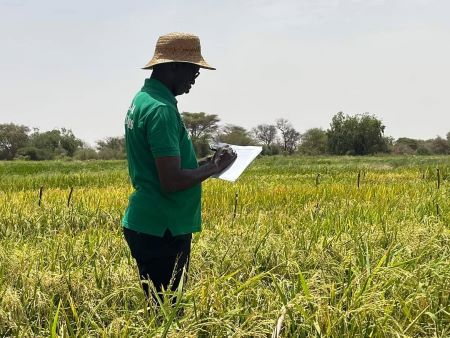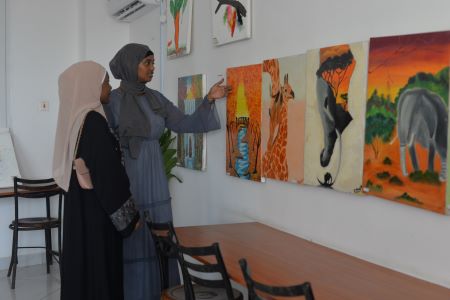Treezer Michelle Atieno
“Rice is a primary crop in many African nations, yet the absence of reliable seed systems means most locally grown rice comes from seeds farmers save themselves. These seeds aren’t purified or screened, resulting in low-quality harvests. Consequently, countries, particularly those in West Africa, must import rice to meet their needs. Unfortunately, the challenges are worsened by global climate change.” said Dr. Omar Faye Ndaw, a rice breeder from Senegal.

Dr Omar Faye, Director of the project
Rice, serving as a vital staple crop across numerous nations in Africa and South Asia, has grappled with persistently low productivity, leading some countries to allocate precious resources toward importing it. However, China has undertaken substantial investments in research aimed at enhancing rice seeds and production methods over recent decades. Presently, China stands as one of the foremost contributors to global rice production, possessing considerable resources and expertise poised to benefit regions worldwide.

Dr. Omar Faye leading the inspection of the growth of rice in Senegal.(Photo by Dr Omar)
Recognizing this potential, the Gates Foundation has forged alliances with the Chinese Academy of Agricultural Sciences (CAAS) to facilitate the dissemination of China’s substantial knowledge in this domain. One notable outcome of such collaborations is the Green Super Rice (GRS) project for Africa, which materialized years after its inception in China under the auspices of the Chinese Academy of Agricultural Sciences.
Africa currently spends over $5 billion importing rice, which is about 40% of the rice it needs. Rice consumption in Africa is going up by about 8% each year, while the amount grown only increases by less than 6% annually. This creates a gap of over 12 million metric tonnes. More than half of the 43 countries in Africa that grow rice end up importing it, with import rates ranging from 10% to 93%. For instance, Nigeria, which imports most rice in Africa, was projected to import 3.4 million metric tonnes in a year.

Dr. Omar Faye and members of Senegalese Agricultural Research Institute meet rice farmers in one of the Green Super Rice project areas in Senegal(Photo by Dr. Omar)
“Because of climate change and population growth, developing countries are now pressured to increase agricultural productivity by utilizing climate change adaptive crops like rice,” said Enock Chikava, the Interim Director of Agriculture Development at the Bill and Melinda Gates Foundation. “Some high-yield modern varieties are still vulnerable to inclement weather, pests and disease.”

A Chinese expert from Chinese Academy of Agricultural Sciences and Nigerian farmers test new GSR rice varieties (Photo by Gates Foundation)
“Rice farmers and smallholders in Africa increasingly face declining yields due to climate-related stress and biotic and abiotic factors. Gates Foundation in partnership with Chinese Academy of Agricultural Sciences, Consortium of International Agricultural Research Centers (CGIAR), Senegalese Institute of Research and Agriculture and International Rice Research Institute through innovative and precision breeding tools, have developed GRS varieties to address yield reduction and yield stagnation.” said Dr.Omar Faye, the director of Senegalese Institute of Research and Agriculture.
Faye explained that GSR varieties are superior rice varieties that can produce high and stable yields under fewer inputs. They require fewer chemical fertilizers, pesticides and water, and are more tolerant to pests, diseases, drought, salinity changes, submergence and other abiotic or biotic stresses.
“Research and adoption of GRS varieties aim to help tackle the global burden of increasing populations, food production and farmer incomes with its 20% increase in yield across varying challenging growing conditions. The GSR project has successfully bred 78 varieties of GSR for 18 target countries across Asia and Africa. Since the project launch, over 6.12 million hectares have been used to grow GSR across the two continents with the hopes of supporting 30 million resource-deprived smallholder farmers.” said Faye.

A Green Super Rice farm in Senegal (Photo by Dr. Omar)
Target countries in Africa include Rwanda, Uganda, Senegal, Mali and Nigeria. “In Nigeria, the project cultivated two varieties of rice at four demonstration sites during the 2022 dry season. Despite facing significant challenges from COVID-19 and political instability, these rice varieties yielded approximately 30% and 50% more than the popular local varieties. Subsequent local production trials of both new varieties also yielded positive results.” said Faye.
He added that a similar positive outcome occurred in Mali, where the GRS varieties led to successful harvests in 2023 along with the successful completion of the first hybrid rice seed production trial, creating a seed production model suited to the local environment.
The GRS research team has also developed an effective molecular breeding strategy which has been implemented to reduce the selection period of new varieties from 8-10 years to just 4-6 years. By using this method to produce multiple varieties of GSR, target countries can select plants that meet the country-specific agricultural requirements like a drought-prone country or region.
“In West Africa, six GSR varieties have been developed with high-yield potentials and strong tolerances to drought, iron toxicity and salinity. Roughly 14.5 metric tonnes of these seeds were distributed to local rice breeders. The project assisted with the training of around 500 African and Asian scientists, technicians and farmers in agricultural fields such as seed production, crop management and breeding. The hope is the GRS project will help increase countries’ rice capabilities and promote more sustainable growth in the future.” concluded Faye.
Even though the Green Super Rice (GRS) project holds promise, the Bill & Melinda Gates Foundation and its partners face limitations in directly reaching farmers in Africa. “We must collaborate with governments in what we refer to as hand-led inclusive agricultural transformation,” explained Chikava. “For example, we cannot prioritize Malawian farmers over the Malawian government; therefore, they must develop policies enabling the registration of these innovations in their country. This necessitates an accommodating regulatory environment, which many countries are already implementing. Additionally, within the country, a seed system is required to facilitate the dissemination of these innovations, ensuring they progress from breeder seed to certified seed and ultimately reach the farmer.”




